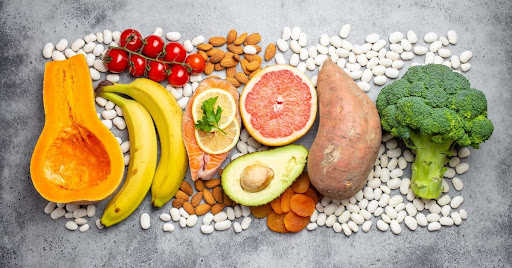Potassium Deficiency and Its Effects: Foods, Symptoms, and Prevention Tips
3 min read
By DocGenie , Published on - 12 December 2024
Potassium is a vital electrolyte and mineral that plays a central role in numerous bodily functions. From regulating heart rhythms and muscle contractions to supporting nerve function and maintaining fluid balance, potassium is crucial for good health. When potassium levels fall below the normal range—a condition known as hypokalemia—the body can experience a variety of complications, some of which can be severe.
In this comprehensive guide, we’ll explore the causes, symptoms, high-potassium foods, and effective prevention tips for potassium deficiency.
What Is Potassium Deficiency (Hypokalemia)?
 Potassium deficiency occurs when blood potassium levels drop below 3.6 mmol/L. It can range from mild (3.0–3.5 mmol/L) to severe (<2.5> mmol/L), with symptoms becoming more intense as the deficiency worsens. This condition often goes unnoticed until it becomes significant enough to cause problems in nerve and muscle function.
Potassium deficiency occurs when blood potassium levels drop below 3.6 mmol/L. It can range from mild (3.0–3.5 mmol/L) to severe (<2.5> mmol/L), with symptoms becoming more intense as the deficiency worsens. This condition often goes unnoticed until it becomes significant enough to cause problems in nerve and muscle function.
What Causes Potassium Deficiency?
Several factors may contribute to low potassium levels, including:- Inadequate Dietary Intake
- Consuming a diet low in fruits, vegetables, and whole foods can reduce potassium intake over time, especially in people following restrictive eating patterns.
- Excessive Fluid Loss
- Vomiting, diarrhea, sweating, and chronic dehydration can lead to potassium being flushed out of the body rapidly.
- Medication Use
- Diuretics, commonly prescribed for high blood pressure and heart conditions, increase potassium excretion through urine.
- Laxatives, especially when misused, also contribute to electrolyte imbalances.
- Chronic Health Conditions
- Conditions such as chronic kidney disease, diabetes, and Cushing’s syndrome can impair potassium regulation.
- Excessive Alcohol or Caffeine Intake
- These substances increase urine output, leading to a loss of potassium and other electrolytes.
Symptoms of Potassium Deficiency
Even mild potassium deficiency can affect the body’s ability to function optimally. Common symptoms include:- Muscle cramps and weakness
- Fatigue or lethargy
- Constipation
- Nausea or abdominal bloating
- Tingling or numbness
- Heart palpitations or irregular heartbeat
- Breathing difficulties in severe cases
In extreme situations, hypokalemia can lead to paralysis or arrhythmias that may be life-threatening. Athletes or people with high physical exertion levels may notice symptoms sooner due to increased potassium demand.
How Is Potassium Deficiency Diagnosed?
- A simple blood test can determine your potassium level. If a deficiency is detected, your doctor may order additional tests such as:
- Urine potassium levels (to assess how much potassium you're excreting)
- Electrocardiogram (ECG) (to check for irregular heart rhythms)
- Kidney function tests
High-Potassium Foods to Include in Your Diet
 Eating a potassium-rich diet is the safest and most natural way to maintain optimal levels. Here are top food sources:
Eating a potassium-rich diet is the safest and most natural way to maintain optimal levels. Here are top food sources:Fruits:
- Bananas – About 400 mg per medium banana
- Oranges & orange juice
- Avocados
- Apricots
- Cantaloupe & honeydew melon
- Prunes and prune juice
Vegetables:
- Sweet potatoes – Over 500 mg per servingSpinach – High in potassium when cooked
- Tomatoes and tomato-based products
- Beets
- Zucchini and squash
Other Potassium-Rich Foods:
- Legumes: Lentils, kidney beans, white beansDairy: Milk and yogurt
- Nuts and seeds
- Fish: Salmon, tuna, and cod
- Whole grains
How to Prevent Potassium Deficiency
- Follow a Balanced Diet
- Include at least 2–3 servings of potassium-rich foods daily.
- Reduce highly processed foods that are often low in potassium and high in sodium.
- Hydrate Well
- Dehydration can reduce potassium levels. Aim for 8–10 glasses of water daily, especially during hot weather or after exercise.
- Monitor Medication Use
- If you're on diuretics, consult your doctor about potassium-sparing options or dietary adjustments.
- Limit Alcohol and Caffeine
- Excessive consumption leads to increased urination, which flushes potassium out of the system.
- Avoid Overuse of Laxatives or Supplements
- These can disrupt electrolyte balance if taken without medical supervision.
- Get Regular Blood Work
- Especially important for people with hypertension, kidney disease, or those on chronic medications.
When Should You See a Doctor?
Seek medical help if you experience:- Persistent fatigue or muscle cramps
- Irregular heartbeat or chest discomfort
- Symptoms following heavy fluid loss (e.g., after diarrhea or vomiting)
- Use of medications that affect electrolyte levels Early diagnosis ensures timely treatment through dietary changes, potassium supplements, or in some cases, intravenous potassium under hospital care.



